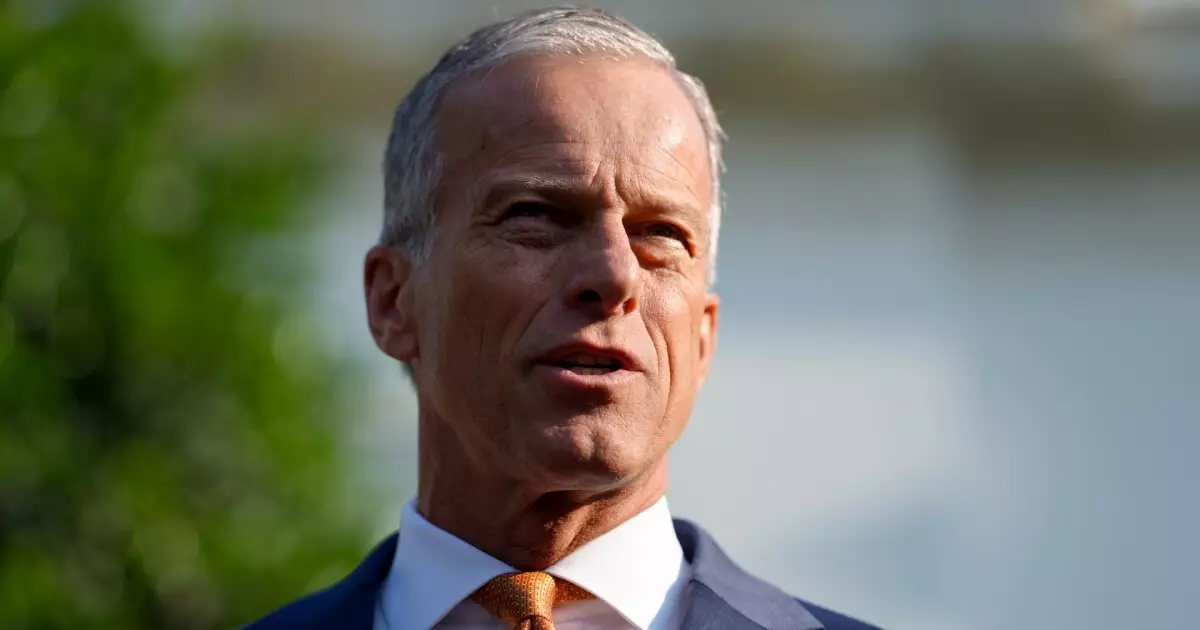The One Big Beautiful Bill Act (OBBBA) aims to reshape the fiscal landscape of the United States, yet its approach displays an unsettling disconnect with the reality most Americans face. With a specific focus on the state and local tax (SALT) deduction, the House version of this legislation proposes raising the cap from a mere $10,000 to a staggering $40,000 for tax filers earning below $500,000. At first glance, this appears to be a generous concession, especially aimed at Republican representatives from high-tax states such as New York, New Jersey, and California. However, skepticism abounds regarding whether this lofty aspiration will ever materialize in the Senate, where opinions diverge sharply.
Senate Majority Leader John Thune’s remarks illustrate a notable absence of enthusiasm for the SALT issue among Republican senators. Thune’s stark assertion—”there really isn’t a single Republican senator who cares much about the SALT issue”—reflects a larger bipartisan conflict over fiscal priorities. Indeed, the lack of representation from high-tax states in the Senate means that voices advocating for SALT reforms may fall on deaf ears. This brings to the forefront the question: who truly benefits from this purported generosity?
The Arithmetic of Tax Cuts: A Dangerous Game
The proposed alterations to SALT deductions carry serious financial implications, a fact underscored by experts like Garrett Watson from the Tax Foundation. Watson highlights a mathematical conundrum in the bill: tax cuts exceeding $4 trillion paired with a projected increase in the budget deficit by approximately $2.6 trillion over the next decade. Given that lawmakers continuously express concern over managing a burgeoning national debt, can we afford to dangle such exorbitant tax breaks in front of voters?
Even more troubling is the pervasive belief among tax analysts that a more permissive SALT deduction would stifle sound tax policy. Instead of targeting effective fiscal strategies to bolster the economy, this legislation exemplifies the perilous strategy of using temporary fiscal measures to curry favor with constituents. The ironclad rule of fiscal responsibility appears to be conveniently ignored, sacrificing long-term budgetary sustainability for short-term political gains. This dilemma reveals an unsettling truth: the OBBBA could tragically pave the way for an economically unsustainable future.
The Shadow of Pass-Through Exemptions
Compounding the complexity of the SALT deduction is the proliferation of workarounds like pass-through exemptions (PTEs). These mechanisms, which allow business owners to sidestep the SALT cap by leveraging state tax credits, cast a shadow over the real intentions behind the OBBBA. While proponents of SALT reform argue that lifting the cap is essential, they are inadvertently masking the underlying issues within the tax code and creating an environment ripe for exploitation.
If the House successfully nudges the SALT adjustments through the Senate, speculation suggests that PTEs could become obsolete, leading to further complications down the road. The passage of the House bill could indeed reshape the tax landscape, but at what cost? The Senate’s apparent disinterest in endorsing such an expensive and convoluted approach to SALT reform suggests that lawmakers may be playing with fire—a risky gambit that might ignite a political backlash from constituents seeking relentless accountability.
A Crossroads of Interests
As the SALT battle rages on, various interest groups are vying for influence, striving to reign in an “out-of-control” budget process. Budgetary discipline should never be a mere footnote in legislative discussions, yet that seems to be the trend emerging from the ongoing negotiations. Lawmakers eager to elevate their constituencies’ interests should realize that a robust economy relies on a balanced budget, not reckless spending excuses masquerading as benevolence.
As this high-stakes drama unfolds on Capitol Hill, many wonder who exactly is calling the shots and for whose benefit. While lifting the SALT cap might appeal to a narrow demographic of affluent voters, the broader implications of such policies reflect a deviation from genuine fiscal responsibility. As Republicans and Democrats maneuver for position in this debate, the opportunity for real tax reform risks becoming increasingly overshadowed by selfish political agendas.

